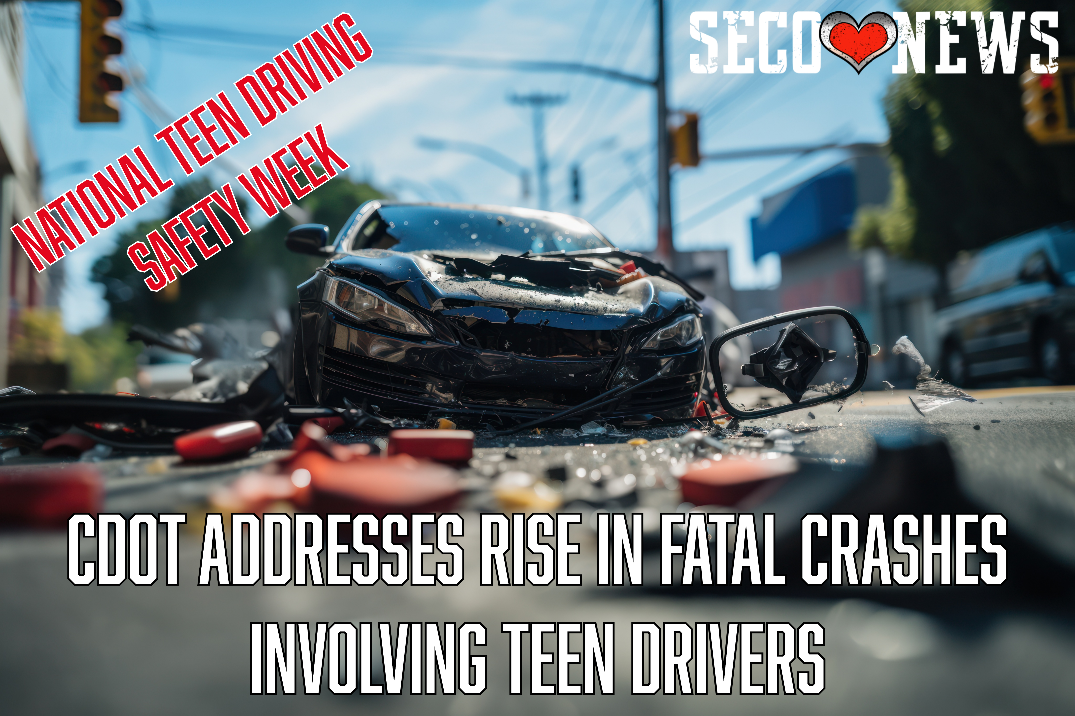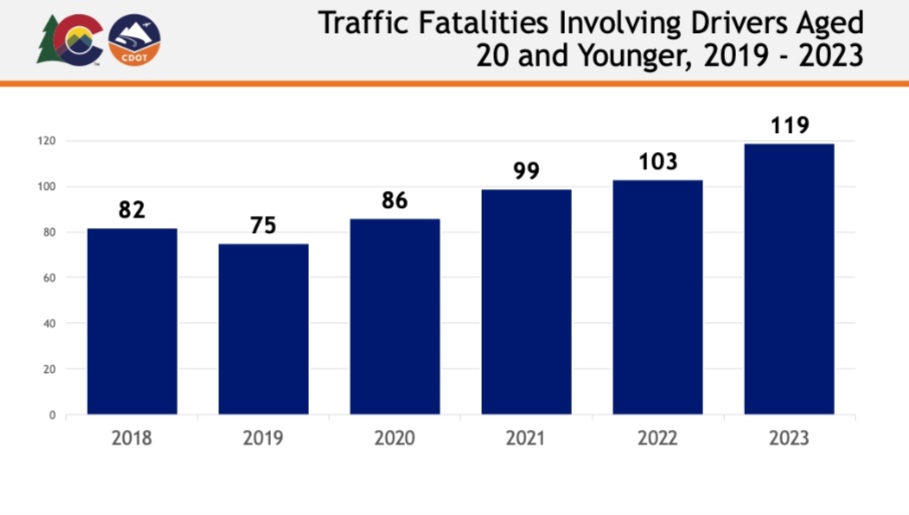CDOT Addresses Rise in Fatal Crashes Involving Teen Drivers

Description: Teen Driving Safety in Focus: Over 8,000 Teen Drivers Involved in Crashes in Colorado So Far in 2024, CDOT Urges Parents to Take Action...

CDOT Addresses Rise in Fatal Crashes Involving Teen Drivers During National Teen Driving Safety Week; Urges Parents to Get Involved
Fatalities up by almost 60%
Statewide — More than 8,000 teen drivers have been involved in crashes in Colorado so far this year, according to CDOT crash data. That’s approximately 23 every day. Also concerning is the number of fatal crashes that involve teen drivers. Last year, 119 roadway fatalities involved drivers aged 20 or younger, which is an increase of 59% over the last five years.
National Teen Driving Safety week is Oct. 20-26 and provides a crucial opportunity for parents, guardians and young drivers to discuss the life-and-death importance of safe driving practices. In Colorado, 38 teen drivers have died so far this year on the road.

Speeding is a critical safety issue for teen drivers. In 2022, it was a factor in 30% of the passenger vehicle teen drivers involved in fatal crashes. Seat belt use is also a concern. Tragically, seat belt use is lowest among teen drivers. In fact, the majority of teenagers involved in fatal crashes are unbuckled. In 2022, 50% of teen drivers who died were unbuckled. Even more troubling, when the teen driver involved in the fatal crash was unbuckled, nine out of 10 of the passengers who died were also unbuckled.
"National data shows that teen drivers have crash rates nearly four times those of drivers 20 and older per mile driven, so it is important that they receive education and oversight even after the license is earned," said Col. Matthew C. Packard, chief of the Colorado State Patrol. "Whether overconfidence, pressure from friends or lack of experience, we can all help the next generation of drivers by paying attention to how they leave and arrive from home as well as occasionally continuing to ride with them while sharing calm and honest feedback."
Even though the minimum legal drinking age is 21, national data shows 22% of 15- to 18-year-old passenger vehicle drivers involved in fatal crashes in 2022 had been drinking. Drugs other than alcohol – illicit as well as prescribed and over-the-counter – can affect a teen’s driving.
“It’s important that we, as parents, help young drivers make smart decisions when it comes to driving,” said CDOT’s Office of Transportation Safety Director Darrell Lingk. “This includes setting clear ground rules, modeling good driving behavior, and having ongoing conversations about the dangers of distracted driving, impaired driving and speeding. We all must play a role.”
CDOT emphasizes the need for parents and guardians to play an active role in shaping their teen's choices behind the wheel. To help protect your teen and guide them toward responsible driving, here are some key strategies:
-
Have conversations: Initiate open and ongoing discussions with your teen about driving laws and safe driving practices. Your guidance as a parent can make a significant difference.
-
Know the laws: Familiarize yourself with Colorado’s nighttime driving restrictions, passenger restrictions, and graduated driver licensing (GDL) rules. Enforcing these laws with your teen promotes safer driving habits.
-
Be a role model: Set an example by consistently practicing safe driving habits yourself — including driving distraction free and obeying the speed limit. Your teen is more likely to emulate your behavior.
-
Address cell phone use: Encourage your teen to put away their phones while driving, designate a passenger as a texter or navigator, or pull over safely before using a mobile device. Remind them that texting while driving is six times more dangerous than drunk driving, according to the National Highway Traffic Safety Association (NHTSA).
-
Promote responsible choices: Discuss the risks of impaired driving, seat belt non-compliance, distracted driving, speeding, and the influence of passengers with your teen. Emphasize the consequences of not following these rules.
Parents are the number one influence on a teen driver’s safety. Self-reported surveys show that teens whose parents impose driving restrictions and set good examples typically engage in less risky driving and are involved in fewer crashes. CDOT urges parents and guardians to be a good example and get involved in their driving habits from the beginning and stay involved for the duration of their teen years.
For more information about Colorado’s GDL laws and teen driving, visit CDOT’s teen driving webpage here.
Follow SECO News on Facebook.
Subscribe to the SECO News YouTube Channel.
Press releases Sponsor




.png)


.png)




.png)



.png)


.png)







